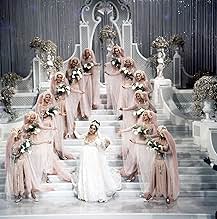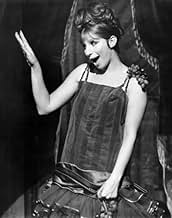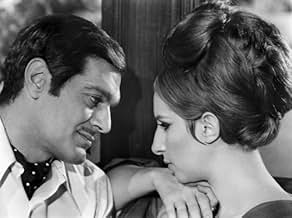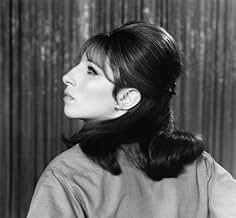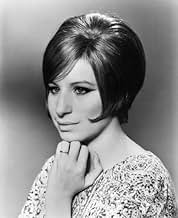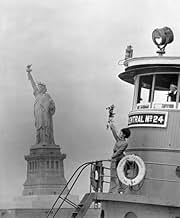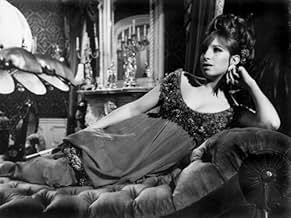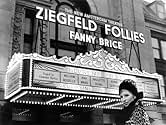Funny Girl
- 1968
- Tous publics
- 2h 31m
IMDb RATING
7.4/10
27K
YOUR RATING
The life of Fanny Brice, famed comedienne and entertainer of the early 1900s: her rise to fame as a Ziegfeld Girl, her subsequent career, and her personal life, particularly her relationship... Read allThe life of Fanny Brice, famed comedienne and entertainer of the early 1900s: her rise to fame as a Ziegfeld Girl, her subsequent career, and her personal life, particularly her relationship with Nick Arnstein.The life of Fanny Brice, famed comedienne and entertainer of the early 1900s: her rise to fame as a Ziegfeld Girl, her subsequent career, and her personal life, particularly her relationship with Nick Arnstein.
- Won 1 Oscar
- 8 wins & 16 nominations total
Karen Stride
- Ziegfeld Girl
- (as Karen Lee)
Featured reviews
Quite simply, Barbra Streisand's extraordinary, scintillating Oscar-winning debut in this classic is one of the finest musical-comedy performances ever committed to celluloid. Better than that...I'd venture to say that alongside Vivien Leigh's masterful performance in "Gone With The Wind," Barbra's portrayal of vaudeville icon Fanny Brice may be one of the most ambitious, captivating turns by a lead actress ever captured on film. Even Barbra-phobes would have to concede that the woman completely knocked herself out with "Funny Girl" and her renditions of "I'm The Greatest Star," "My Man," "People" and especially the pulse-jolting "Don't Rain On My Parade" rank right up there with the best of Judy Garland ("Over The Rainbow," "The Trolley Song" and "The Man That Got Away."). Because Streisand has been an exalted Hollywood legend for many decades, people tend to almost take her remarkable talents - both as an actress and as a singer - for granted now but this opulent musical, sparkling score and her thrilling, take-no-prisoners performance will endure as a testament to what pure show business, high octane theatricality and legitimate talent are all about. Sing Proud, Barbra!
...Perhaps not. But for nearly 2 1/2 hours in "Funny Girl," Barbra Streisand at least makes a convincing case for herself.
Forget about the television airings you've seen. Throw away your old video cassette copy. Instead, see the restored, widescreen, road show version now in limited theatrical release. It is the ONLY way to truly appreciate the talents of Ms. Streisand and, more notably, the film's brilliant director, William Wyler.
Movies today no longer look like movies. The highest compliment one can pay "Funny Girl" is that it is a grand, glorious MOVIE in the truest sense. Wyler's brilliance is never more evident than in his glorious treatment of the "Don't Rain on My Parade" sequence, the stunning camerawork of "The Swan," and the incredibly effective set-up of the "My Man" finale.
Ms. Streisand doesn't really give a performance; she simply is Barbra. Every "Barbra-ism" that we have come to know, love and hate over the years is already crystallized at this point. Her brashness can be off-putting, but by the end of the movie, one is completely won over by the sheer enormity of her talent and presence. Yes, you can see the beginnings of the blind egomania that has marred her performances for the last 20-odd years (to be generous); but you cannot deny her brilliance, either. And to see her extraordinary face in full-screen close up is breathtaking. Kudos to the director, lighting director, and make-up artist for making Streisand appear so wonderful in this.
From the sweepingly orchestrated titles to the high-drama impact of the showstopping finale, this is Entertainment with a capital E. About 20 minutes could have been trimmed, and exactly why Omar Sharif was cast remains a mystery; but at the end of the picture, these quibbles are trivial. Did I laugh? Yes. Did I cry? Yes. Was I thrilled, excited, entertained? You betcha.
Forget about the television airings you've seen. Throw away your old video cassette copy. Instead, see the restored, widescreen, road show version now in limited theatrical release. It is the ONLY way to truly appreciate the talents of Ms. Streisand and, more notably, the film's brilliant director, William Wyler.
Movies today no longer look like movies. The highest compliment one can pay "Funny Girl" is that it is a grand, glorious MOVIE in the truest sense. Wyler's brilliance is never more evident than in his glorious treatment of the "Don't Rain on My Parade" sequence, the stunning camerawork of "The Swan," and the incredibly effective set-up of the "My Man" finale.
Ms. Streisand doesn't really give a performance; she simply is Barbra. Every "Barbra-ism" that we have come to know, love and hate over the years is already crystallized at this point. Her brashness can be off-putting, but by the end of the movie, one is completely won over by the sheer enormity of her talent and presence. Yes, you can see the beginnings of the blind egomania that has marred her performances for the last 20-odd years (to be generous); but you cannot deny her brilliance, either. And to see her extraordinary face in full-screen close up is breathtaking. Kudos to the director, lighting director, and make-up artist for making Streisand appear so wonderful in this.
From the sweepingly orchestrated titles to the high-drama impact of the showstopping finale, this is Entertainment with a capital E. About 20 minutes could have been trimmed, and exactly why Omar Sharif was cast remains a mystery; but at the end of the picture, these quibbles are trivial. Did I laugh? Yes. Did I cry? Yes. Was I thrilled, excited, entertained? You betcha.
Barbra Streisand made one the biggest debuts in the history of films playing Fanny Brice in Funny Girl. She also won an Oscar as best actress of 1967 for her efforts. Although this musical bogs down a bit in the second half, Streisand keeps the viewer glued to the screen with her brilliant portrayal of this great star. Terrific musical numbers come one after another, and Streisand shifts gears effortlessly between comic gems like "I'm the Greatest Star" and "The Roller Skate Rag" and signature tunes like "People" and "Don't Rain on My Parade." Her closing rendition of "My Man" is very effective (and was copied by Diana Ross in Lady Sings the Blues). Big and bright and splashy, Funny Girl is one of the last great, old-style musicals produced in Hollywood. Omar Sharif, Walter Pidgeon, Anne Francis, Kay Medford, Mae Questel, Frank Faylen, and Lee Allen co-star. Meford won a supporting Oscar nomination as the mother. Pidgeon should have been nominated for his role as Flo Ziegfeld. And I think Questel is a scream as the local yenta. But the center of this film is Streisand. Every number is a gem, and she looks great. There may be better musicals, but you'd be hard pressed to name a better performance in a musical than Barbra Streisand playing Fanny Brice in Funny Girl.
Others in the cast include Gertrude Flynn and Penny Santon as the card players, Tommy Rall as the prince in the ballet sequence, Mittie Lawrence as the maid, Gerald Mohr as the gangster, Inga Neilsen and Bettina Brenna as show girls, and Elaine Joyce in the roller skating number.
Others in the cast include Gertrude Flynn and Penny Santon as the card players, Tommy Rall as the prince in the ballet sequence, Mittie Lawrence as the maid, Gerald Mohr as the gangster, Inga Neilsen and Bettina Brenna as show girls, and Elaine Joyce in the roller skating number.
There are not enough superlatives in the world to bestow on Barbra Streisand for her rags-to-riches portrayal of 20s Ziegfeld Follies star Fanny Brice. To say she gives the single most triumphant musical performance ever showcased on the silver screen could be close. I am constantly bowled over with each viewing at how the 26-year-old Brooklyn novice ever pulled off this incredible stunt. Cinderella playing Cinderella. Even the finicky Hollywood powers-that-be, who NEVER use untried screen talent for such a weighty role (Julie Andrews and "My Fair Lady" come to mind), knew that nobody but Barbra could inhabit this part. She won the Oscar, naturally, and it was befitting that the newcomer should share this honor with perhaps the greatest screen legend ever, Katharine Hepburn.
Barbra's Fanny Brice first conquered Broadway where she lost the Tony award to another irrepressible talent, Carol Channing, for "Hello Dolly!" She got her revenge of sorts years later when she won the coveted screen role of Dolly due strictly to her auspicious debut in "Funny Girl." Transferred to celluloid, the movie loosens its bustles quite a bit and grants more breathing room for Barbra to expand her natural comic and dramatic talents both keenly and intimately amid the elaborate sets and costumes.
The timing of this film couldn't have been better for Streisand. The late 60s ushered in a new legion of stars. The rash of talent coming to the forefront purposely lacked the super-model good looks and incredibly-sculpted physiques of their predecessors. Audiences now clamored for realism...human imperfection. What less attractive guys like Dustin Hoffman and Al Pacino did for the men, Barbra did for the distaff side. She dragged out her own Cinderella version, making a virtue of her odd looks and gawky gait while laying out her two big trump cards -- she was a supreme song stylist and a gifted, self-deprecating cut-up.
Hardly ever off screen, Streisand totally immerses herself in the role of chorus clown-turned-Ziegfeld headliner, weaving a spell around each and every song she touches. From the stubbornly optimistic "I'm the Greatest Star" to the profoundly touching "My Man", the actress matures Brice into the glowing swan of her own dreams, while exposing a deep, personal vulnerability she never recaptured (or allowed) again on screen -- to her detriment.
Despite heavy critical lambasting, I still say exotically handsome Omar Sharif was indeed the consummate choice to play wanderlust husband and card shark Nicky Arnstein. Polished, prideful and totally in his element as the global-gambling playboy, one can believe the ungainly Fanny (or Streisand, for that matter) placing this glossy god on a pedestal. It may not appear to be much of a stretch (in real life, Sharif was a world-class bridge player), but he owns the part as much as delightful Kay Medford does as Brice's droll Jewish mama. Everyone else, however, is pretty expendable. It's been said that Anne Francis blamed Streisand for her supposedly top featured role being butchered. If it's true, she has an open-and-shut case. Francis was left with a nothing part.
Highly fictionalized and weak as biography, Streisand champions above the sometimes grandiose material from the moment she utters her first classic words: "Hello, gorgeous!" And so she is.
Barbra's Fanny Brice first conquered Broadway where she lost the Tony award to another irrepressible talent, Carol Channing, for "Hello Dolly!" She got her revenge of sorts years later when she won the coveted screen role of Dolly due strictly to her auspicious debut in "Funny Girl." Transferred to celluloid, the movie loosens its bustles quite a bit and grants more breathing room for Barbra to expand her natural comic and dramatic talents both keenly and intimately amid the elaborate sets and costumes.
The timing of this film couldn't have been better for Streisand. The late 60s ushered in a new legion of stars. The rash of talent coming to the forefront purposely lacked the super-model good looks and incredibly-sculpted physiques of their predecessors. Audiences now clamored for realism...human imperfection. What less attractive guys like Dustin Hoffman and Al Pacino did for the men, Barbra did for the distaff side. She dragged out her own Cinderella version, making a virtue of her odd looks and gawky gait while laying out her two big trump cards -- she was a supreme song stylist and a gifted, self-deprecating cut-up.
Hardly ever off screen, Streisand totally immerses herself in the role of chorus clown-turned-Ziegfeld headliner, weaving a spell around each and every song she touches. From the stubbornly optimistic "I'm the Greatest Star" to the profoundly touching "My Man", the actress matures Brice into the glowing swan of her own dreams, while exposing a deep, personal vulnerability she never recaptured (or allowed) again on screen -- to her detriment.
Despite heavy critical lambasting, I still say exotically handsome Omar Sharif was indeed the consummate choice to play wanderlust husband and card shark Nicky Arnstein. Polished, prideful and totally in his element as the global-gambling playboy, one can believe the ungainly Fanny (or Streisand, for that matter) placing this glossy god on a pedestal. It may not appear to be much of a stretch (in real life, Sharif was a world-class bridge player), but he owns the part as much as delightful Kay Medford does as Brice's droll Jewish mama. Everyone else, however, is pretty expendable. It's been said that Anne Francis blamed Streisand for her supposedly top featured role being butchered. If it's true, she has an open-and-shut case. Francis was left with a nothing part.
Highly fictionalized and weak as biography, Streisand champions above the sometimes grandiose material from the moment she utters her first classic words: "Hello, gorgeous!" And so she is.
I've seen this film many times,and I've always thought it was one of Barbra Streisand's best films because it allowed her to use her strengths as a comedian, singer, and dramatic actor. It's clear that her presence dominates the movie; however, there are some excellent supporting players, including Kay Medford as Fanny Brice's mother Rose and Walter Pigeon as Florenz Ziegfeld, two very fine character actors. Rose is particularly likable because, unlike her daughter Fanny, she sees things as they are and not the way they should be. This applies to her comment about Nick Arnstein, the handsome gambler that Fanny marries, despite the fact that Rose perceives him to be a "sponge."
Fanny, as shown in this film, is also very likable not only because of her humor but for her generosity and thoughtfulness. Her ambition, of course, is to conquer the stage and she does so fairly quickly after making a great mess of a roller skate number at the local dance hall. Before long, Fanny is auditioning for Ziegfeld, the famous impressario and she wins him over with her talent and charm. Nick Arnstein, a man about town, always seems to be around Fanny when she triumphs on the stage and this time is no different. He buys her a beautiful bouquet of roses with a note, "Dear Star, I told you so." Very soon, Fanny and Nick become involved in a relationship which is often on and off until Fanny literally proposes to him. What follows is a heartbreaking story of a young woman whose desire to be loved for herself alone and her passion for a happy domestic life is thwarted by fate and some wrong choices.
After a montage of the first year of their marriage together, problems start affecting the Arnstein marriage. It is true that they are wealthy people; however, their problems aren't minor. Nick begins to lose heavily at the gaming table and everything he tries ends in failure. Fanny, on the other hand, continues to be successful on the stage and Nick starts to resent her. Suddenly, all of his gentlemanly charm and good manners disappear as if by magic; he's rude to Fanny, making her upset over things that a truly married couple would find a way to resolve. Indeed, he starts ignoring her deliberately and places his interests and needs above hers. After a while, the marriage collapses not because of Fanny's career but the way in which Nick looks at their relationship (we discover this near the end of the film.) He also conceals his financial problems from her, shutting Fanny out of his life as though she didn't exist.
All of this culminates in Nick's unfortunate involvement in a shady bond scheme which sends him to prison for two years. I would say that these problems are rather huge. I don't want to give more away because I feel others should have the opportunity to see the film and judge for themselves. But I have to say that the ending of the movie, is, in my opinion, one of the most heartfelt, dignified, and classiest moments ever put on film. And Barbra Streisand makes the most of it, touching us not only with her excellent performance of the song "My Man" but also by the way her Fanny carries herself, taking responsibility for her choice and showing that she will go on with her life, despite what's happened to her.
Fanny, as shown in this film, is also very likable not only because of her humor but for her generosity and thoughtfulness. Her ambition, of course, is to conquer the stage and she does so fairly quickly after making a great mess of a roller skate number at the local dance hall. Before long, Fanny is auditioning for Ziegfeld, the famous impressario and she wins him over with her talent and charm. Nick Arnstein, a man about town, always seems to be around Fanny when she triumphs on the stage and this time is no different. He buys her a beautiful bouquet of roses with a note, "Dear Star, I told you so." Very soon, Fanny and Nick become involved in a relationship which is often on and off until Fanny literally proposes to him. What follows is a heartbreaking story of a young woman whose desire to be loved for herself alone and her passion for a happy domestic life is thwarted by fate and some wrong choices.
After a montage of the first year of their marriage together, problems start affecting the Arnstein marriage. It is true that they are wealthy people; however, their problems aren't minor. Nick begins to lose heavily at the gaming table and everything he tries ends in failure. Fanny, on the other hand, continues to be successful on the stage and Nick starts to resent her. Suddenly, all of his gentlemanly charm and good manners disappear as if by magic; he's rude to Fanny, making her upset over things that a truly married couple would find a way to resolve. Indeed, he starts ignoring her deliberately and places his interests and needs above hers. After a while, the marriage collapses not because of Fanny's career but the way in which Nick looks at their relationship (we discover this near the end of the film.) He also conceals his financial problems from her, shutting Fanny out of his life as though she didn't exist.
All of this culminates in Nick's unfortunate involvement in a shady bond scheme which sends him to prison for two years. I would say that these problems are rather huge. I don't want to give more away because I feel others should have the opportunity to see the film and judge for themselves. But I have to say that the ending of the movie, is, in my opinion, one of the most heartfelt, dignified, and classiest moments ever put on film. And Barbra Streisand makes the most of it, touching us not only with her excellent performance of the song "My Man" but also by the way her Fanny carries herself, taking responsibility for her choice and showing that she will go on with her life, despite what's happened to her.
Did you know
- TriviaWilliam Wyler was asked by a friend whether Barbra Streisand had been hard to work with. He replied, "No, not too hard, considering it was the first movie she ever directed."
- GoofsAfter Nick's release from prison in 1927, he and Fanny did not sadly but amicably part. Instead, Nick rewarded Fanny's years of support by almost immediately starting a series of affairs. Fanny demanded he give her grounds for divorce and even had their children's last name legally changed to Brice. Although he and Fanny would meet again several years later, he never attempted to see his children again.
- Quotes
Fannie Brice: I'm a bagel on a plate full of onion rolls!
- Alternate versionsThe original theatrical version included an additional overture before the opening credits, an intermission after "Don't Rain On My Parade," and exit music after the end credits. These additional music pieces have been restored for the DVD release.
- ConnectionsFeatured in This Is Streisand (1968)
- How long is Funny Girl?Powered by Alexa
Details
- Release date
- Country of origin
- Language
- Also known as
- Funny Girl: Chica rara
- Filming locations
- Jersey Central Railway Station, Jersey City, New Jersey, USA('Don't Rain On My Parade' sequence)
- Production companies
- See more company credits at IMDbPro
Box office
- Budget
- $14,100,000 (estimated)
- Gross US & Canada
- $52,223,306
- Opening weekend US & Canada
- $65,560
- Sep 3, 2001
- Gross worldwide
- $52,225,786
- Runtime
- 2h 31m(151 min)
- Color
- Aspect ratio
- 2.35 : 1
Contribute to this page
Suggest an edit or add missing content




